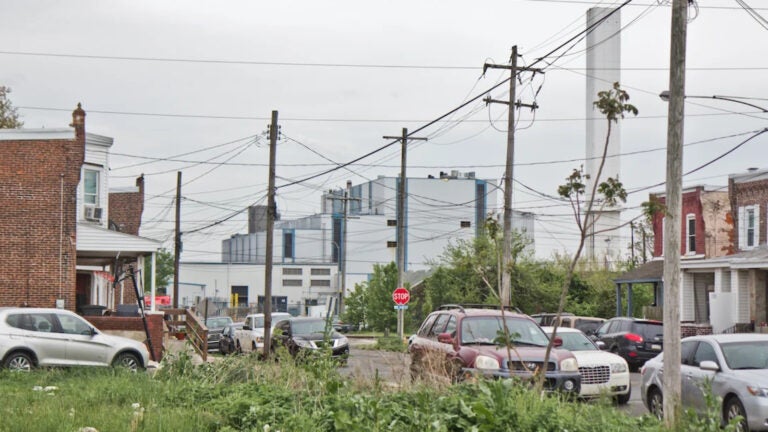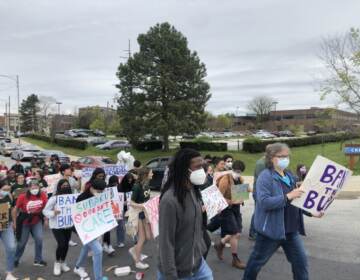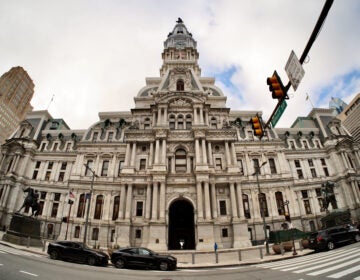Tons of Philadelphia’s trash are burned in Chester. A bill in City Council could stop that
The proposal would require the city to rethink its waste disposal contracts after they expire next summer.

File - The Chester Covanta incinerator, a waste-to-energy facility that burns trash, seen from Lewis Street in Chester, Pennsylvania, in 2021 (Kimberly Paynter/WHYY)
Have a question about Philly’s neighborhoods or the systems that shape them? PlanPhilly reporters want to hear from you! Ask us a question or send us a story idea you think we should cover.
Philadelphia could stop sending its trash to be burned in Chester, under a bill introduced to City Council Thursday.
The bill would ban the city from signing new waste disposal contracts with companies that burn trash to produce energy, such as Reworld, formerly Covanta, which runs a waste-to-energy incinerator in Chester in Delaware County.
Zulene Mayfield, chairperson of the advocacy group Chester Residents Concerned for Quality Living, which wants to see the Reworld facility shut down, said the city has received “everybody else’s garbage” for decades.
“Everything that we can divert away from that incinerator will improve our lives and the air quality for everybody,” she said.
Around 40% of Philadelphia’s trash is incinerated, according to the city’s latest waste management plan, which reported data from 2018. The rest is buried in landfills.
Of all the waste incineration facilities the city utilizes, the Reworld facility in Chester accepts the most.
The city’s contract with Reworld expires at the end of June 2026, according to the office of Councilmember Jamie Gauthier, who sponsored the legislation. The city’s contract with Waste Management, which manages the city’s waste with both landfills and incinerators, expires at the same time.
“Neither disposal method is perfect,” Gauthier said. “Landfilling is not perfect, but trash incineration has a greater impact not only on the environment, but on the people who live around trash incinerators. I think that’s something that we have to be cognizant of.”
Reworld paints its waste incinerators as a sustainable alternative to landfills.
The Chester facility produces enough electricity to power around 51,000 homes each year, according to the company. A spokesperson for Reworld said the facility also helps avoid the planet-warming methane emissions that come from landfills.
But the Chester incinerator releases fine particulate matter, volatile organic compounds and nitrogen oxides — pollutants known to exacerbate respiratory conditions, such as asthma and cardiovascular issues. The Reworld spokesperson said the facility’s emissions are “below federal and state limits,” although it has been cited for environmental violations in recent years.
“Our children and our community, we just literally cannot breathe,” Mayfield said.
To Gauthier, banning trash incineration contracts would “end [Philly’s] role in perpetuating environmental racism in Chester.”
Over 70% of Chester’s residents are Black. More than 1 in 4 Chester residents lives in poverty, more than in Philadelphia.
“Being cleaner and greener can’t just be thought about as only within [Philadelphia’s] borders,” Gauthier said. “It cannot come at the expense of a city who is more vulnerable than we are.”
“And, we’re breathing the same air,” she added.
A rejection of ‘Chester is Chester’
The incineration of Philadelphia’s trash in Chester made headlines in 2023 when Philadelphia Democratic mayoral candidates were asked about the Reworld facility and charges of environmental racism in Chester.
“Chester is Chester,” responded then-candidate Jeff Brown.
The comment drew criticism from other candidates, including Cherelle Parker.
“That response is the same way you treat the Black and brown community” in Philadelphia, she said, adding that she would work with nearby leaders, including then-Mayor of Chester Thaddeus Kirkland.
A spokesperson for Parker’s office did not respond to a request for comment on Gauthier’s legislation Thursday.
Philadelphia’s last contract with Reworld, then called Covanta, passed City Council unanimously in 2019.

Get daily updates from WHYY News!
WHYY is your source for fact-based, in-depth journalism and information. As a nonprofit organization, we rely on financial support from readers like you. Please give today.









